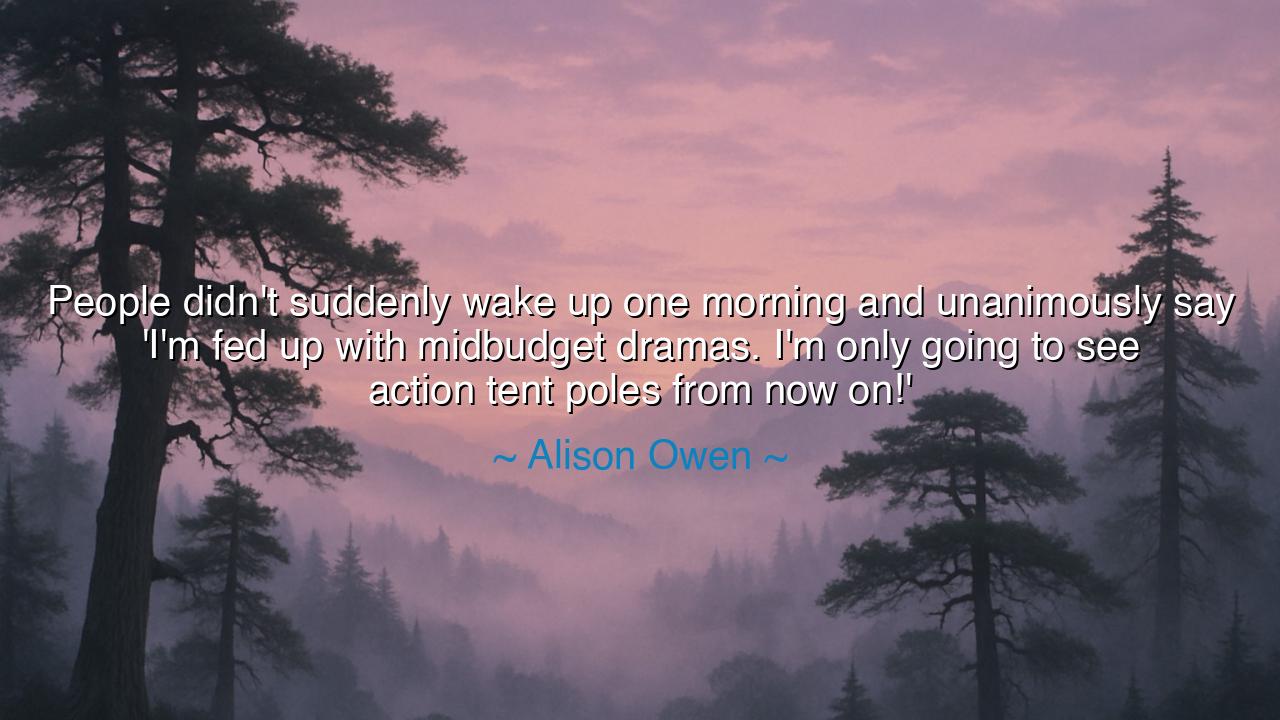
People didn't suddenly wake up one morning and unanimously say
People didn't suddenly wake up one morning and unanimously say 'I'm fed up with midbudget dramas. I'm only going to see action tent poles from now on!'






"People didn't suddenly wake up one morning and unanimously say 'I'm fed up with midbudget dramas. I'm only going to see action tent poles from now on!'" These words by Alison Owen reflect a truth about the evolution of the entertainment industry, a shift that was not the result of a single decision or a collective will, but rather a series of gradual changes in tastes, culture, and economics. The rise of blockbuster films over the past few decades, particularly those in the genre of action-packed spectacles, did not emerge overnight, nor was it a simple abandonment of one form of cinema for another. Instead, it was the result of a complex interplay of market forces, cultural shifts, and the evolving desires of audiences. Owen’s words invite us to reflect on the organic nature of change and the forces that shape our choices, often without our full awareness.
In the ancient world, change was often a slow, inevitable process, like the rising of the tide. The Romans, for example, did not suddenly declare one day that they would abandon their Republic for an Empire. Instead, the transition occurred over time, driven by military expansion, economic needs, and political dynamics. In much the same way, the shift in the film industry from smaller, more intimate films to larger-than-life spectacles did not happen in a single moment of revelation but through a series of cultural, technological, and market-driven shifts. Much like the fall of the Roman Republic, the changing landscape of the film industry reflects the gradual movement of the tide, pushing what was once central into the periphery, and elevating the new.
Take, for instance, the Greek theatre. In its early years, the plays of Aeschylus, Sophocles, and Euripides were deeply rooted in the tragic drama of human life—plays that were thoughtful, introspective, and grounded in moral lessons. Yet, over time, the structure of theatre evolved, and with the rise of Alexander the Great, the nature of entertainment itself began to shift. As Greek culture expanded across the world, the theatre became a tool for not just philosophical exploration but also mass entertainment. What was once intimate became grand, mirroring the changing political landscapes and growing empires. This transformation in entertainment, much like the rise of action films today, wasn’t born out of a sudden preference but was a response to changing needs, new technologies, and the broader forces of society.
The rise of Hollywood blockbusters is similar, for it did not happen overnight, nor was it the direct result of a collective decision to move away from midbudget dramas. In fact, the origins of modern blockbusters can be traced back to the post-World War II era, where the global economy and technological advancements led to an increasing demand for escapism. The rise of films like Jaws (1975) and Star Wars (1977) marked the beginning of a trend toward films that were not only grand in scope but also designed to appeal to as wide an audience as possible. Over time, as movie studios realized the potential for high-budget, wide-appeal films, the industry evolved. Owen’s quote touches on this realization that the rise of the action tent pole was not the result of a sudden shift in public opinion but the culmination of economic, cultural, and technological factors that made it a dominant force in the entertainment industry.
This phenomenon mirrors historical transitions in art and culture. In Renaissance Italy, the shift from religious to more secular themes in art was not born from a sudden decision to abandon spirituality, but from a cultural awakening—a reconnection with humanism and a rediscovery of individual expression. Similarly, in literature, the transition from the Romanticism of the 19th century to the more modernist approaches of the 20th century wasn’t the result of a single decision but rather a long process of cultural transformation and artistic evolution. In both instances, as with the shift from midbudget dramas to blockbusters, there was a cumulative change, a gradual adjustment to the new realities of the time.
The lesson here is not just about the changing nature of entertainment, but about the larger principle that cultural change is rarely the product of a single, conscious decision. Just as society evolves through incremental shifts, so do our preferences, desires, and the ways we engage with the world around us. When we look at the world today, we must understand that much of what we now take for granted—be it in entertainment, politics, or culture—is the result of complex, layered forces. Change does not always come in the form of dramatic revolutions but often through the subtle currents that shape the larger tide of history.
In our own lives, it’s important to remember that the changes we see around us—whether in the world of entertainment, technology, or politics—are not always the product of a single event. They are the result of multiple influences, often unseen, that build upon one another over time. Just as the Roman Empire rose from small beginnings, and blockbusters emerged as the dominant form of cinema, so too can we understand that progress, though it may seem abrupt, is often the culmination of many years of change. Let us then approach the world with the understanding that evolution—in all its forms—is slow, and that sometimes the most profound shifts happen beneath the surface, over time, rather than in sudden moments of change.






AAdministratorAdministrator
Welcome, honored guests. Please leave a comment, we will respond soon